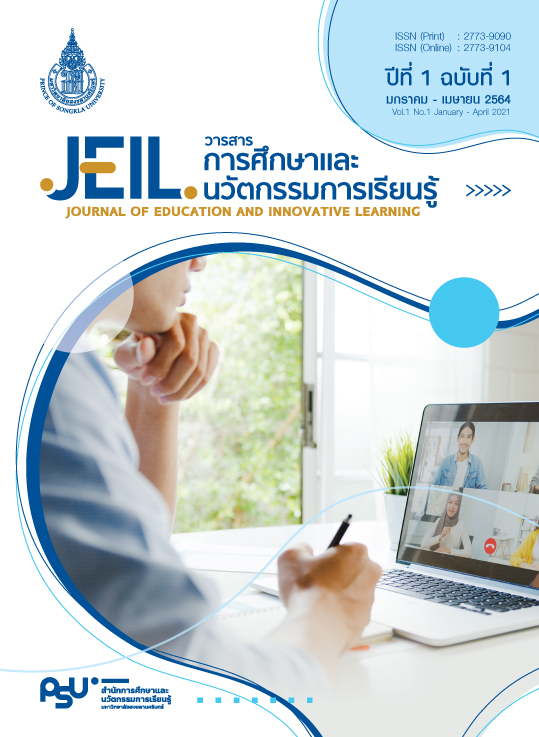ผลสัมฤทธิ์ทางการเรียนและพฤติกรรมการมีส่วนร่วมหลังการเรียนโดยใช้เทคนิคจัดการเรียนแบบใฝ่รู้ของวิชาโลหิตวิทยาคลินิก
Main Article Content
บทคัดย่อ
การวิจัยครั้งนี้มีวัตถุประสงค์เพื่อประเมินผลสัมฤทธิ์ทางการเรียนและพฤติกรรมการมีส่วนร่วมจากการจัดการเรียนแบบใฝ่รู้ในการเรียนการสอนวิชาโลหิตวิทยาคลินิกในนักศึกษาเทคนิคการแพทย์ ชั้นปีที่ 3 โดยแบ่งการศึกษาเป็น 2 กลุ่ม กลุ่มที่ 1 ทำการเปรียบเทียบแบบทดสอบก่อนและหลังการเรียนร่วมกับทำแบบสอบถามพฤติกรรมการเรียนรู้ในการเรียนแบบบรรยายและกรณีศึกษาของนักศึกษาชั้นปีที่ 3/2558 จำนวน 57 คน และกลุ่มที่ 2 ทำการเปรียบเทียบแบบทดสอบก่อนและหลังการเรียนร่วมกับ ทำแบบสอบถามพฤติกรรมการเรียนรู้ในการเรียนแบบบรรยายร่วมกับการจัดการเรียนการสอนแบบ สืบเสาะหาความรู้และการให้ข้อมูลแบบป้อนกลับของนักศึกษาชั้นปีที่ 3/2560 จำนวน 48 คน ทำการวิเคราะห์ข้อมูลโดยการใช้สถิติทดสอบทีเปรียบเทียบระหว่างกลุ่มตัวอย่าง 2 กลุ่มที่เป็นอิสระต่อกัน ผลการวิจัยพบว่าผลสัมฤทธิ์ทางการเรียนของกลุ่มที่ 2 มีค่าเฉลี่ยสูงกว่ากลุ่มที่ 1 อย่างมีนัยสำคัญทางสถิติที่ระดับ .05 นอกจากนี้ พบว่าผลสัมฤทธิ์ทางด้านพฤติกรรมของนักศึกษาในวิชาโลหิตวิทยาคลินิกและปฏิบัติการโลหิตวิทยาคลินิกมีค่าเฉลี่ยเพิ่มขึ้นจาก 4.26 4.27 เป็น 4.55 4.49 ตามลำดับ การศึกษาครั้งนี้แสดงให้เห็นว่าการจัดการเรียนการสอนแบบสืบเสาะหาความรู้และการให้ข้อมูลแบบป้อนกลับทำให้นักศึกษามีผลสัมฤทธิ์ทางการเรียนดีขึ้น มีส่วนร่วมในการเรียน รวมถึงอาจารย์ผู้สอนสามารถติดตามความเข้าใจของนักศึกษาได้อีกด้วย
Article Details

อนุญาตภายใต้เงื่อนไข Creative Commons Attribution-NonCommercial-NoDerivatives 4.0 International License.
เนื้อหาและข้อมูลในบทความที่ตีพิมพ์ในวารสารการศึกษาและนวัตกรรมการเรียนรู้ ถือเป็นข้อคิดเห็นและความรับผิดชอบของผู้เขียน ซึ่งกองบรรณาธิการวารสาร ไม่จำเป็นต้องเห็นด้วยหรือร่วมรับผิดชอบใด ๆ และไม่สงวนสิทธิ์การคัดลอกบทความเพื่อใช้ประโยชน์ทางวิชาการ แต่ให้อ้างอิงข้อมูลแสดงที่มาของบทความทุกครั้งที่นำไปใช้ประโยชน์
เอกสารอ้างอิง
Demaria, M., Barry, A., & Murphy, K. (2019). Using inquiry-based learning to enhance immunology laboratory skills. Frontiers in immunology, 22(10), 1-5.
Dunbar, K. N., & Klahr, D. (2012). Scientific thinking and reasoning. In K. J. Holyoak and R. G. Morrison (Eds.), The oxford handbook of thinking and reasoning. Oxford: Oxford University. doi:10.1093/oxfordhb/9780199734689.013.0035
Klahr, D. (2000). Exploring science: The cognition and development of discovery processes. Cambridge, MA: MIT Press.
Kuhlthau, C. C., Maniotes, L. K., & Caspari, A. K. (2007). Guided inquiry: Learning in the 21st century. Westport, CT: Libraries Unlimited.
Lazonder, A. W., & Harmsen, R. (2016). Meta-analysis of inquiry-based learning: Effects of guidance. Review of educational research. 86, 681–718.
Martineau, C., Traphagen, S., & Sparkes, T.C. (2013). A guided inquiry methodology to achieve authentic science in a large undergraduate biology course. Journal of Biological Education, 47(4), 240–245.
Sumranwanich, T., Boonthaworn, K., Singhakaew, S., & Ounjai P. (2019). Time-restricted inquiry-based learning promotes active student engagement in undergraduate zoology. Laboratory Journal of Microbiology & Biology Education, 20(1), 1-4.


